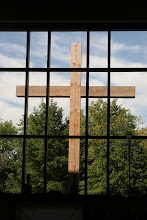Last year I found an article in the March issue of “The Lutheran” magazine called 40 Days Without Shaving. The author, Vic Larson, tells about his tradition of giving up shaving for Lent. “Each year on Ash Wednesday I go home from our solemn evening service of ashes and before retiring for the night, I wash my face and put away my electric razor until Easter.” He admits the first time he did it, it was kind of fun. But something else happened, and each time he looked into the mirror, he remembered, “Oh, yeah, it’s Lent.”
Tomorrow is Ash Wednesday again, and with a cross of ashes on our foreheads, we will remind ourselves that we are mortal and, as Walter Brueggemann writes in his commentary on Genesis, “death in and of itself belongs properly to the human life that God wills for mankind.” You are dust and to dust you shall return. (Genesis 3: 18)
Some Christian traditions hold an Easter vigil on Easter Saturday night. This lengthy service recalls our faith story, and ends with singing and light and rejoicing as the hope of the glorious resurrection is celebrated. During the vigil, there is often a baptism or two, which helps us to remember that although we will die an earthly death, that we lament our sinfulness, we are washed clean in the waters of baptism and so we get not what we deserve, but what God extends us by grace. We are reminded that we have the hope and privilege to turn to God from whom comes life because we know that we are creatures who face death. And by God’s grace through the life and death and resurrection of Jesus, death will never have the last word.
Vic Larson’s Lenten beard reminds him of original sin from which we are washed clean in our baptism. He recalls the words of Martin Luther. “Original sin is in us, like the beard. We are shaved today and look clean, and have a smooth chin; tomorrow our beard has grown again, nor does it cease growing while we remain on earth.”
Larson writes, “I can shave my beard, but the hair returns to remind me each day. And so I go through life ‘shaving’ and failing, then shaving again.”
We will never be the perfect reflection of Christ while we journey through this life on earth. Even as we strive to live the way God would have us live, we will fail again and again. And then we face death. So we serve God with courage, and we hold fast to what is good. And we remember that through Jesus Christ we are forgiven, and that God, through the power of the Holy Spirit keeps and holds us in eternal life.
A prayer for Ash Wednesday
Merciful God, accompany our journey through these forty days. Renew us in the gift of baptism, that we may provide for those who are poor, pray for those in need, fast from self-indulgence and above all that we may find our treasure in the life of your Son, Jesus Christ, our Savior and Lord, who lives and reigns with you and the Holy Spirit, one God, now and forever, Amen. (from the Ash Wednesday Service found in the Evangelical Book of Worship Minneapolis: Augsburg Fortress, 2006 p. 254.)
Monday, February 15, 2010
Subscribe to:
Post Comments (Atom)


Thank you-I needed to hear this today-as my human failings are particularly evident. I will remember to serve God with courage and hold fast to what is good. And turn away from self-indulgence-
ReplyDeleteHi, I've been the pianist for a Lutheran church and have run into a communication gulf with the pastor, who is a beautiful person and tireless servant of Christ. I need to know whether the gulf is from Lutheranism itself or from his take on it. So like here you remind parishioners that we're dust and will return to dust, and that we will continue to fall. Thing is, it's possible to get to where one takes that as the simple premise, and that's the case with me. And I find that all the sobering wonder of the Christian life begins once that is installed as the simple premise. So for me, the way the pastor takes it as his job to remind recalcitrant people of that, it guarantees that the need for firm reminding will continue. So it's in fact doing something else than it appears to be doing on the surface.
ReplyDeleteAnd it's at every turn. There's no end of variations on the theme, so I'm perpetually having to break in with, "But it's possible to actually hear that and heed. And life begins when we do," and he takes that as prideful. Taking our mortality and dependence on Christ as the operating premise is prideful?
If the ministry is defined as telling people what they don't know, then there becomes a need for them to continue not knowing it, which makes it problematic what telling them consists of. That may sound like a clever sophism, but it's the painful reality I'm experiencing here.